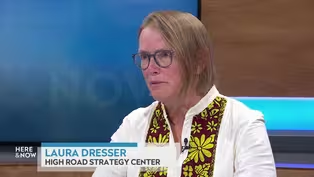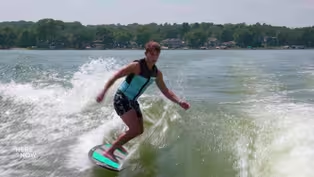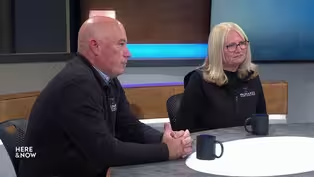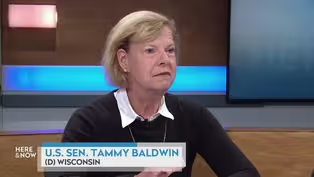Here and Now
Here & Now for September 5, 2025
Season 2400 Episode 2409 | 26m 48sVideo has Closed Captions
Watch the entire episode of Here & Now for September 5.
Watch the entire episode of Here & Now for September 5.
Problems playing video? | Closed Captioning Feedback
Problems playing video? | Closed Captioning Feedback
Here and Now is a local public television program presented by PBS Wisconsin
Here and Now
Here & Now for September 5, 2025
Season 2400 Episode 2409 | 26m 48sVideo has Closed Captions
Watch the entire episode of Here & Now for September 5.
Problems playing video? | Closed Captioning Feedback
How to Watch Here and Now
Here and Now is available to stream on pbs.org and the free PBS App, available on iPhone, Apple TV, Android TV, Android smartphones, Amazon Fire TV, Amazon Fire Tablet, Roku, Samsung Smart TV, and Vizio.
Providing Support for PBS.org
Learn Moreabout PBS online sponsorshipPBS Wisconsin original production.
>> A Wisconsin senator weighs in on Make America Healthy Again, and as students pack back into the classroom, school officials take stock of student enrollment and state budget numbers.
Good evening.
I'm Zac Schultz filling in for Frederica Freyberg tonight on "Here& Now".
Senator y Baldwin discusses changes to Medicaid and the ACA school budget.
C a reprieve under new special education reimbursement rates.
t impacts on lakes stir up controversy.
And finally.
Jobs and wages make gains.
But there's concern for workers.
It's "Here& Now" for September 5th.
[MUSIC] & Now" is provided by the Focus Fund for Journalism and friends of PBS Wisconsin.
>> It's been two months since Donald Trump signed into law his big, beautiful bill.
And while the cuts to Medicaid included in the bill don't take effect until 2027, Democrats are already sounding the alarm on the overall impact.
Joining us now is U.S.
Senator Tammy Baldwin.
Thanks for joining us.
>> Thanks for having me.
>> So you've been touring the state to talk with providers and patients about these cuts.
What are you hearing?
en visiting critical access hospitals in rural areas of the state.
Their margins were thin to begin with before the passage of this.
Now they're looking at heartbreaking decisions about perhaps closing off certain departments because they are not profitable, and to help them stay afloat.
And some we know in Wisconsin will be looking at shutting their doors, particularly troublesome is the decision some hospitals have made to stop having obstetrics delivery, meaning that there are places in Wisconsin where women have to travel literally hours to get the services they need.
And it's harming the health and well-being of Wisconsin.
And it's not just one small example.
You know, there were big nutrition cuts in the bill.
And so visiting food pantries and those who are focused on food security and recognizing the impact that those cuts are going to have.
And we also deal with an issue of the premium tax credits for Affordable Care Act health coverage.
Those will end at the end of this year, and we're going to see those impacts almost immediately.
All of us are going to pay more.
And what's so ironic?
You know, this is Trump's signature legislation.
He came into office vowing to lower costs on everything.
Right.
Groceries, but health care, etc.
this bill that has just passed, which is predominantly tax legislation benefiting large corporations and the very richest, it's going to bring costs up for everyone and especially health care costs.
>> Republicans claim the bill only creates work requirements for Medicaid.
It doesn't push anybody off.
>> You can't cut $1 trillion out of Medicaid over ten years without kicking people off who are eligible.
And that's what we're going to see happening.
But again, the Affordable Care Act tax credits expire at the end of this year.
We're going to see a lot of Wisconsinites losing access to private insurance through the health care marketplace much sooner than the impacts of the Medicaid cuts.
>> Now, yesterday, we saw the Health and Human Services Secretary, Robert Kennedy, RFK, Jr. testify before a Senate committee about his decision to fire the CDC director, among other things, that he's done.
There's a growing list of Democrats and organizations calling for him to be fired or resign.
Are you on that list?
>> I am among them.
I call on him to resign.
Look, between his massive layoffs, mass firings, and his refusal to administer grants that he's required by law, and the cutting off of biomedical research and his choice to put his own personal politics on vaccines above science is literally endangering the health of Wisconsinites who I represent.
And I would not only call on him to resign, but I'd call on my Republican counterparts, many of whom got assurances directly from RFK Jr that he would not put his own conspiracy theories ahead of rock solid science as he's doing.
And they feel betrayed.
I think, by by RFK Jr. And I hope they'll stand up with me calling on him to resign.
>> Speaking of vaccines, we saw Florida announced they're moving to eliminate vaccine requirements.
We have a measles outbreak in Oconto County in Wisconsin.
How do you draw the line between vaccine mandates or requirements and personal health care choices that some people make of whether or not to vaccinate themselves or their children?
>> Well, first of all, I feel that it would be incredibly unwise to start having a patchwork quilt of state regulations on these.
We need to follow the science, and there is rock solid science that, like the measles vaccine work, and they prevent outbreaks like we've seen not only in Wisconsin but in Texas, where two children have died unnecessarily.
And so I think that these decisions do have to be made by parents in consultation with their ors.
But science needs to be in the lead here.
And RFK Jr has spent his career prior to getting nominated as as Health and Human Services secretary, peddling in these conspiracy theories about vaccines.
And so it's very dangerous to have him at the helm right now.
>> Switching from health care.
Earlier this week, the president of the Milwaukee Police Union said he'd be okay with Donald Trump deploying National Guard troops to Milwaukee to Republicans running for governor of Wisconsin have joined that call.
Would you support troops in Milwaukee?
>> Look, what I support is safety and cracking down on crime.
And I think that, you know, the the National Guard are totally unsuited.
They sign up for guard duty because of a different mission entirely.
And we should be spending those resources helping cities like Milwaukee or other communities have the adequate policing staff that they need.
>> There are a lot of Democratic voters around the state that are frustrated with Democrats in Washington saying they haven't done enough to stand up to Donald Trump.
What would you tell them?
What what is being done that maybe they aren't seeing?
Or is it more that could be done?
>> Look, I think that we have seen in this president somebody who is willing to violate the Constitution, violate the law, and where the the president is breaking the law and violating the Constitution.
We're bringing this up in court.
And frankly, we're winning a lot of those cases.
The justice system is working in many of these instances.
And then lastly, it's us standing with our constituents and fighting back through, through, you know, preparing for elections in the ballot box, but also to stand up as citizens and speak out against the overreaches and abuses.
r Tammy Baldwin, thanks for your time.
>> A major compromise included in the new state budget says the state will provide 90% of the funding for high cost special education students.
To detail how this will impact schools, we are joined by two members of the Waunakee School District.
Steve Summers is the executive director of business ns, and Tiffany Logan is the director of special education.
Thank you both for joining us.
>> Thank you for having us.
>> Tiffany, let's start with you.
Give me the quick definition of high cost special education student.
And how many do you have in Waunakee?
high cost, it's any student that their services meet the threshold of $30,000 or more for that individual student.
So in our district we have between 60 and 70 students that would meet that threshold, at least for last.
This last year, they met about 60 to 70 students.
at's the financial impact of going to 90% from, you know, mid Leow to low 30%?
>> Sure.
The reimbursement level that we received in 2425 was about $300,000.
We expect that's going to increase by about $400,000 this year and another 350,000 the following year.
So very significant investment from the state into this program.
>> And so what is the plan for how that money will be spent?
Where will it be redirected in the budget?
>> We did decide.
We took to the school board proposal to begin a new program, an alternative program for elementary age students that need a little more intensive support than what we can provide in a regular education classroom.
And the board was really supportive because of this additional funding, because we could speak to using the high cost funds to fund the program.
And it's starting starting this week.
>> So is there an obligation for districts to keep that money in special education, because some districts have had to pull from general ed to fund special education?
>> Yeah, the increased funding does go into our special education fund in some district case that may reduce the transfer that is needed from the General Education Fund to the special ed fund in our district.
We will partner together between the business office and the special ed office to improve or increase our investment in students who have IEPs, whether it's the program that Tiffany's referencing or whether when we need to add an additional one on one paraeducator for students o move in.
But we tend to utilize the funds to increase the services for students with IEPs.
>> So, Tiffany, there are already skeptics saying that schools are going to push more kids into this category to try and grab more state dollars.
Should we expect to see an increase in the number of kids that have this definition applied to their IEP?
>> I don't think you'll see an increase in the number of students.
I think what you're going to see in future years is an increase in the number of districts that are applying for high cost, special education aid.
Now that the the percentage is increasing, there's more of an incentive for districts to apply for that aid.
So I don't think you're going to see a student increase, but tely additional districts applying for those funds.
districts before that weren't providing all the services that potentially they could have to some of these students because they couldn't afford it or what was the rationale there?
>> So in the last fiscal year, there were about 270 organizations or school districts that applied for this funding.
And there's more than 400 school districts in Wisconsin.
So for many of them, they determine that the reimbursement level that was coming back wasn't significant enough for the investment in the time to go through and file the claim.
For others, they may not have identified students that were $30,000 or more and above.
Tiffany and I are partnering with our professional organizations this year to help provide professional development across the state.
We do expect more schools to learn about this system, how it works, and because of the increased investment from the state, we are expecting more districts are going to be willing to spend the time necessary to really apply for and manage these funds.
>> So the state budget also included a jump in the reimbursement rate for regular special education om 32% to 42%.
Is that a bigger number overall for most schools than this high cost?
>> Yes, it's a significantly bigger number for most schools than the high cost.
In our case is an example.
It's an over $800,000 increase in additional funding for l ed students in 2526, and it's the largest increase I've seen in my career.
So it's significant and what it's going to allow most schools to do is to benefit all students.
I think it's important to that an increase in funding for special education students benefits the entire school system.
Students, both with and without IEPs, because when a school special education fund is not funded correctly, the fund ten or the general fund has to reimburse, which removes opportunities for students who don't have IEPs.
So it truly benefits all kids for special ed funding to be at a more appropriate level.
>> And Tiffany, working with these kids can be very rewarding, but it can also be very challenging.
And there's a lot of turnover in some of these paid staffing positions.
Could you see an increase in funding for wages to try and keep more consistency there?
>> Yeah, I think that I think that could be a possibility.
I think it will.
Increasing wages definitely helps you to recruit people and be able to keep them.
I mean, just example, for our district alone, we had 12 full time positions open this summer and we're very close to being full staffed.
But it's definitely difficult to keep people, especially in our paraprofessional positions, who are really working with some of our highest needs students.
ll right.
Steve Sommer, Tiffany Loken from the Waunakee School District, ank you for your time.
>> Thank you, thank you.
Appreciate it.
>> Labor day marks the unofficial end to the 2025 boating season in Wisconsin.
But what isn't ending is the controversy over whether wake surfing and wake boats should be allowed on some lakes.
Tonight, Murv Seymour tells us why this battle is likely to carry over into next season.
>> Rain or shine, big and small Wisconsin lakes are a state and national treasure.
>> It's a critical resource to the state of Wisconsin.
>> Especially during summer.
>> When I came up here, I fell in love with the place.
>> This place Jeff Meessmann speaks of is Natural Lakes, a 380 home lake community in the Northwoods of Vilas County.
>> It has one of the highest concentrations of freshwater lakes in the world.
one of them, 220 acre McCullough Lake in Presque Isle, where street names reflect some of the rich wildlife seen along these winding rural roads.
>> We see bear here.
We see wolves here.
Coyotes.
>> Jeff Meessmann loves McCullough Lake and the lakes of Wisconsin.
It's why he moved here.
>> We're an advocate for the protection of our lakes.
>> Guided by his boat with a bucket of gadgets.
>> Normally, what we do is we take samples in the deep hole.
ad 300ft from shore to the deepest part of McCullough Lake.
hor in, and we should be about 26ft.
oes on three other lakes, he voluntarily grabs water samples on behalf of the Department of Natural Resources.
He tells me the lake data dates back more than 20 years.
>> So I'm going to be recording the temperature.
>> He checks the temperature in depth of the water.
e top of the surface of the water, all the way down to 15ft was very consistent.
>> He also checks water clarity with this Black and white patterned tool called a Secchi disk.
>> So I'm going to pull it up to where I can just see it, which is right there.
>> Finally, using a six foot pole made of PVC, he lls a water sample from six feet under.
It's then sent to the DNR for testing.
While you'll see loons, bald eagles and massive fish on McCullough Lake.
One thing you won't see is wake surfers and most likely wake boats.
>> They're wrecking our lakes and wake surfing needs to be regulated to the proper size lake.
>> Jeff Meessmann and other like minded lake stewards believe wakesurfing wrecks.
Water quality produces too big of a wake, and they believe the boats destroy the bottom of smaller lakes and erodes shorelines.
Most importantly to Jeff, he believes wake boats increase the risks and spread of invasive species from lake to lake.
Meessmann has led the way, banning wake surfing on McCullough and more than 60 other lake communities statewide.
>> It's going to stop a lot of paddlers and kayakers and just people on on pleasure cruises, on pontoon boats from enjoying the lakes.
We saw one wake boat on our lake four years ago, and I took it into action right away and we stopped it.
Now, Presque Isle for the last year has had an ordinance in place and it doesn't ban wake boats.
It bans the activity of wake surfing.
>> 240 miles away in southern Wisconsin, you'll find Redline Watersports Redline Watersports.
is Mars.
>> And a totally different opinion.
of the story.
>> When you step into redline.
Owner Paul Virtucci says.
g to get slapped in the face with the active water sports lifestyle.
We've got gear, water, skis, wakeboards.
We also saw pontoons.
>> More importantly than all of that, Paul Virtucci tells me he sells bringing families together through water sports.
Inside his office, he has family pictures in the window, on the wall, on his desk.
He even has a family picture stuck to his computer.
But for him, one particular picture says it all.
>> I think I was probably 3 or 4 years old as my father and I.
It was the first family boat.
It's been in my blood ever since.
>> Like Jeff Meessmann Paul Virtucci loves Wisconsin s and fun on the water.
>> It's what my family did growing up.
God gave us these beautiful lakes, and if we don't enjoy them, it's our fault.
And if we don't take care of them, it's our fault.
t the Marshall Park boat launch in Middleton.
Once he arrives in the desired spot with a couple of touches to the screen, this high powered boat transforms itself, sucking in as much as 3,300 pounds of lake water into its ballast system.
>> Ready now.
Here we go.
For the sport of wakeboarding, we just.
>> Use the center plate.
And that kind of helps us get up on top of the water with.
oes.
Three generations of watersports enthusiasts on this afternoon run on Lake Mendota.
>> Johnny Z.
Over here.
Mid 30 seconds.
Outstanding athlete.
ld Kyle Polster, who has been on the water with family for a long time.
s like six months old, I've been out on the water.
I learned to ski when I was 2 or 3.
>> And then Joe D'Amato, who is on the other end of things.
>> Actually started a little later in life on the water sports.
>> To be able to do this well into your 60s and 70s.
>> One by one they ski water board and wakesurf, which requires the boat to produce the largest wake artificially.
>> So right now, through all the engineering, we've just created this beautiful wake from the running surface of the boat and the devices, and we're going t 11.3, 11.3 miles an hour and just cruising down a lake.
glide on water?
y freedom.
Hopefully, the camera picked up the big smile on my face and I wanted to shout out, to be honest with you, but it just felt so good for my age at 67.
It's just it's just a great sport.
>> Unlike Jeff Meessmann, Paul Virtucci and his crew believe banning work surfing wrongfully punishes families because of a few bad boaters.
>> It's so easy just to say that's bad, that's bad without really getting all the facts and understanding who you're affecting.
>> It was more the fact that it was something that we could all do.
I want to have the opportunity to do this my whole life, and I want to be able to have my grandkids or great grandkids out on the water.
It hurts.
>> The access for people who might own a house there, or that's where they grew up vacationing, or it's the closest lake that they have available to them.
>> While most only see the beauty in the surface of the lake, Jeff Meessmann cares about what's happening all the way to the bottom, which is why he worries about the potential damage wake boats can do.
Both sides believe it's time for state lawmakers or the Department of Natural Resources to step in to create a statewide standard on where wake surfing is allowed.
Paul Virtucci believes 200 to 250ft from shore, in a minimum of 20ft of water, is far and deep enough to protect the environment and others on the water.
Jeff Meessmann wants three times that distance in a minimum of 30ft of water, on lakes, 1500 acres and larger.
In a written statement, the DNR tells me the department is actively reviewing the latest science and will continue to review and consider any new information.
They recommend that all interested stakeholders keep up with upcoming meetings of the Natural Resources Board for future updates.
Back on the water.
Both sides believe they're scientists and not the others.
>> Wake surfing is scientifically proven to damage the bottom to beyond 20ft deep damage the shorelines make the lake dangerous for everyone else to use.
om I've spoken with, all are under the same belief that if we operate these boats in a little deeper water, we're fine.
Every boat that runs around the lake is going to create a wake, and it's going to disturb the lake and make it rougher.
>> The battle over wake boats and wake surfing reminds Paul Virtucci of another battle on the water.
He thinks both sides can find a compromise if they simply talk and not go off the deep end with each other.
, Jet Skis came out, and one of the big issues with them is that they didn't have good muffler systems on, so they were very.
>> Rah rah rah rah.
You can hear them.
the lake.
>> I'm a fisherman, I water ski, I enjoy all the water sports.
I'm not.
After trying to stop somebody from fishing or enjoying the activities, the only activity that I don't agree with is wake surfing.
>> Which represents family and community to so many of those who do it.
>> I don't know if I'd come out on the water if I wasn't able to wake, surf and wakeboard.
>> Reporting from Presque le in Dane County.
I'm Murv Seymour for here now.
>> Monday was Labor Day, and while most families used the holiday as a vacation, it's a good time to check in on the state of the average worker.
And for that, we turn to Laura Dresser, associate director of UW Madison's High Road Strategy Center and the author of the State of Working Wisconsin Report.
anks for being here.
>> I'm so glad to be here.
>> Thank you.
So your most recent report says the median wage has reached an all time high of $25 an hour.
But obviously, federal policies are some chaos.
As you say in the most recent jobs report shows that it's not looking good.
s right.
It's a very there was there's been a very strong recovery from the pandemic shutdowns five years ago.
But we were really beginning to see, especially in those monthly job numbers, troubling signs about the economy, because I think of the federal uncertainty, tariffs and immigration policies.
>> So the numbers show that June was revised down to nothing and slight, very low anemic job reports since then.
Right.
>> Yeah.
The 2025 job growth month over month is is and revised down, like you said, to a negative in June a week, a week, July.
Those numbers are running less than half the 2024 jobs production numbers.
So it's a substantial cooling, really troubling sign in the labor market, both at the national level and most of that showing up in sin, too.
>> So for a few months this year, it felt like we couldn't figure out what tariffs were actually in place or just being threatened.
They were on pause or hold.
Can we relate some of the owdowns to tariffs?
Are those already being felt?
>> I mean, there's two aspects to what what what's going on with tariffs right now.
There's a lot of uncertainty.
Like you said, it's hard to tell.
And I think it's hard for businesses, domestic es and international businesses to plan when the regime is not clear when what is our tariff policy going to be still emerging?
Chaotic giant leaps.
So partly the uncertainty cools off.
Business investment decisions just puts people back on their heels.
And the the At producer levels.
And then also when the tariffs land and they're beginning to land, they increase prices.
They do.
They're a tax on imported goods and that means imported and domestic goods in those market prices will go up.
And so I think there's real concerns I think very some signs that tariffs are beginning to hit but more like concern and the uncertainty really dominating the news right now.
>> So the Pew Research Center recently estimated the number of immigrants in the workforce went down by 1.2 million nationally in just the first six months of the year.
What what impact does that have on the workforce?
We saw unemployment tick up as well.
we see a cooling labor market, but we also know that in especially in specific industries and some very important industries in Wisconsin, agriculture, hotels, food service, ants are a big construction.
Immigrants are a big share of the workforce.
And the fact that they are often staying home or nervous or not coming to the country again.
This tightens the ability of businesses to grow, and is another kind of wet blanket on the economy.
>> We've only got a few seconds left, but historically, fewer workers typically means rising wages, competition from.
Will that happen this time?
>> It it it may I mean there's a lot to see what what washes out.
We've got that kind of impact although there's also.
So ah we'll just have to wait and see.
There's a lot going on price changes because of tariffs, labor impact, demand because of the immigration systems.
And what's going on in the broader economy will probably dominate.
>> And finally, just sorry the last few seconds.
Union membership in Wisconsin is dropping at ten.
The Wisconsin Supreme Court is going to take a look at it.
Will we see a change if they overturn act ten?
>> Changes will be slow.
I think it unemployment.
I'm sorry.
Unionization rates fell in half from 2011 to 2024.
In the state of Wisconsin, they won't double in a day or two to get back to where we were, or even to get back to the national average will take years.
But act ten and what we call what is so-called right to work, you know, the the policy around private sector unionization would have to go to get really large gains in the state as well.
>> All right.
Laura Dresser, thank you so much for your time.
e. >> For more on this and other issues facing Wisconsin, visit our website at PBS Wisconsin.
Org and then click on the news tab.
That is our program for tonight.
I'm Zac Schultz Fredericka will be back next week.
Have a great weekend.
[MUSIC] .
>> Funding for "Here& Now" is provided by the Focus Fund for Journalism and Friends of PBS Wisconsin.
Here & Now opening for September 5, 2025
Video has Closed Captions
Clip: S2400 Ep2409 | 57s | The introduction to the September 5, 2025 episode of Here & Now. (57s)
Laura Dresser on Wages, Unions in Wisconsin Economy
Video has Closed Captions
Clip: S2400 Ep2409 | 4m 18s | Laura Dresser on wage trends, tariffs, the immigration workforce and unions in Wisconsin. (4m 18s)
More Than A Hobby, Communities Debate Impacts of Wake Boats
Video has Closed Captions
Clip: S2400 Ep2409 | 8m 8s | As wake boats become more popular, advocates worry about the impacts on Wisconsin lakes. (8m 8s)
Steve Summers, Tiffany Loken on Special Education Funding
Video has Closed Captions
Clip: S2400 Ep2409 | 5m 39s | Steve Summers and Tiffany Loken on higher state reimbursement rates for special education. (5m 39s)
US Sen. Tammy Baldwin on Health Care and The National Guard
Video has Closed Captions
Clip: S2400 Ep2409 | 7m 9s | Tammy Baldwin on federal health policy changes and a potential National Guard deployment. (7m 9s)
Providing Support for PBS.org
Learn Moreabout PBS online sponsorship
- News and Public Affairs

Top journalists deliver compelling original analysis of the hour's headlines.

- News and Public Affairs

FRONTLINE is investigative journalism that questions, explains and changes our world.












Support for PBS provided by:
Here and Now is a local public television program presented by PBS Wisconsin




